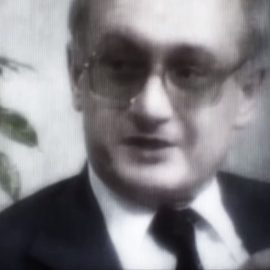So, the teaser trailer for Call of Duty Black Ops: Cold War has raised some eyebrows. Also, it has apparently infuriated some Communists. Which is all to the good. It’s essentially a series of clips from an interview with KGB defector Yuri Bezmenov in the ’80s, discussing Soviet “Active Measures,” the subversion campaign used by the KGB against the Soviet Union’s adversaries, the chief one of which was the United States. The trailer has also been censored in China, ostensibly because of Tiananmen Square footage (though one might wonder if the Chinese, who have also practiced subversion and propaganda to a greater extent than some might realize, might be censoring it for other reasons, as well). I’ve been effectively tuned out of the Call of Duty franchise for a while. I’ve heard some good things about the Modern Warfare reboot (or whatever it is) from last year, but it hasn’t been in the budget (either looking at money or disk space). This surprised me, though. (Especially after Activision/Blizzard bent the knee to the PRC last year.) That a major media company might actually be calling out Communists, and in a much more real-world context, is fascinating. The trailer provides a few
Wuhan Coronavirus and IO

Not being an epidemiologist, I’ve generally tried to avoid talking about the Wuhan Coronavirus (go piss up a rope, Uncle Xi). And the current disruption has got me wondering just how I’m going to continue the Maelstrom Rising series after this, when it comes time to pick it up again. But that’s not what this post is about. There are far more knowledgeable people to talk about the Wuhan Coronavirus itself (and how incomplete and inconclusive much of the data is). I’m going to talk about the comprehensive Chinese Communist Information Operations campaign related to it. The Wuhan Coronavirus first appeared in Wuhan, China, sometime in December, 2019. It was not initially identified as such; there were inexplicable cases of pneumonia, and they were increasing rapidly. Communist countries being what they are, the initial response was more geared toward keeping word from getting out. After all, everything is always perfect in the Workers’ Paradise. So, on January 1st, the Wuhan Public Security Bureau summoned Dr. Li Wenliang and accused him of “spreading rumors.” Dr. Li publicly repented of his “misdemeanors” and promised not to commit further crimes, presumably after being worked over a little. He wasn’t the only one, either;
Russian Information Operations
While I’ve generally tried to stay away from the current partisan mudslinging, anyone who has read Lex Talionis should know that I don’t see the current hyper-ventilating divide getting better anytime soon. And that I also don’t see it as completely homegrown. There has been a lot of hysteria (and casual dismissal) about Russian Information Operations in regard to the election, lately. The Democrats are claiming that the Kremlin “hacked” the election, while the Republicans are demanding proof of actual Russian cyber warfare to effect the election results, which so far is not forthcoming. But what keeps getting lost in the shuffle is what Information Operations are.
